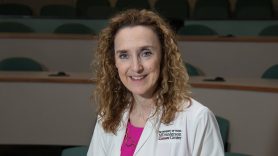- Diseases
- Acoustic Neuroma (14)
- Adrenal Gland Tumor (24)
- Anal Cancer (66)
- Anemia (2)
- Appendix Cancer (16)
- Bile Duct Cancer (28)
- Bladder Cancer (68)
- Brain Metastases (28)
- Brain Tumor (228)
- Breast Cancer (712)
- Breast Implant-Associated Anaplastic Large Cell Lymphoma (2)
- Cancer of Unknown Primary (4)
- Carcinoid Tumor (8)
- Cervical Cancer (154)
- Colon Cancer (162)
- Colorectal Cancer (110)
- Endocrine Tumor (4)
- Esophageal Cancer (42)
- Eye Cancer (36)
- Fallopian Tube Cancer (6)
- Germ Cell Tumor (4)
- Gestational Trophoblastic Disease (2)
- Head and Neck Cancer (6)
- Kidney Cancer (124)
- Leukemia (346)
- Liver Cancer (50)
- Lung Cancer (288)
- Lymphoma (284)
- Mesothelioma (14)
- Metastasis (30)
- Multiple Myeloma (98)
- Myelodysplastic Syndrome (60)
- Myeloproliferative Neoplasm (4)
- Neuroendocrine Tumors (16)
- Oral Cancer (98)
- Ovarian Cancer (172)
- Pancreatic Cancer (166)
- Parathyroid Disease (2)
- Penile Cancer (14)
- Pituitary Tumor (6)
- Prostate Cancer (144)
- Rectal Cancer (58)
- Renal Medullary Carcinoma (6)
- Salivary Gland Cancer (14)
- Sarcoma (236)
- Skin Cancer (294)
- Skull Base Tumors (56)
- Spinal Tumor (12)
- Stomach Cancer (60)
- Testicular Cancer (28)
- Throat Cancer (90)
- Thymoma (6)
- Thyroid Cancer (98)
- Tonsil Cancer (30)
- Uterine Cancer (78)
- Vaginal Cancer (14)
- Vulvar Cancer (18)
- Cancer Topic
- Adolescent and Young Adult Cancer Issues (20)
- Advance Care Planning (10)
- Biostatistics (2)
- Blood Donation (18)
- Bone Health (8)
- COVID-19 (362)
- Cancer Recurrence (120)
- Childhood Cancer Issues (120)
- Clinical Trials (622)
- Complementary Integrative Medicine (22)
- Cytogenetics (2)
- DNA Methylation (4)
- Diagnosis (224)
- Epigenetics (6)
- Fertility (62)
- Follow-up Guidelines (2)
- Health Disparities (14)
- Hereditary Cancer Syndromes (122)
- Immunology (18)
- Li-Fraumeni Syndrome (8)
- Mental Health (116)
- Molecular Diagnostics (8)
- Pain Management (64)
- Palliative Care (8)
- Pathology (10)
- Physical Therapy (18)
- Pregnancy (18)
- Prevention (882)
- Research (384)
- Second Opinion (74)
- Sexuality (16)
- Side Effects (598)
- Sleep Disorders (10)
- Stem Cell Transplantation Cellular Therapy (216)
- Support (404)
- Survivorship (324)
- Symptoms (184)
- Treatment (1764)
Residency program for oncology research nurses eases transition to second career
3 minute read | Published January 11, 2018
Medically Reviewed | Last reviewed by an MD Anderson Cancer Center medical professional on January 11, 2018
Suzanne Phillips enjoyed 26 years working for Dow Chemical Co., much of that time as a researcher in product development. It was a thrill to see packaging that her team had developed on the shelf of her local grocery store.
But a desire to directly impact people, specifically cancer patients, was calling her.
That aspiration led her to nursing school and, ultimately, to her work as a research nurse resident, learning how to help patients on clinical trials in our Lymphoma and Myeloma department.
Attract, develop, retain the best oncology research nurses
Phillips is a participant in a new Research Nurse Residency Program – the first of its kind in the nation – launched at MD Anderson in October 2016. The program is open to new nursing graduates or nurses with less than one year of experience. They don’t need to be embarking on second careers, but the program is drawing the interest of nurses like Phillips.
The goal of the program, modeled after our successful Clinical Nurse Residency Program, is to attract, develop and retain research nurses. The residency consists of a four-week orientation phase followed by a 12-month residency program within a department. It includes more than two weeks of classroom learning throughout the year.
“A vital role” for patients in clinical trials
Research nurses play a vital role for the 9,400 patients enrolled in MD Anderson’s more than 1,000 clinical trials.
“Being a research nurse is a very hard job,’’ says Lore Lagrone, administrative director, protocol research, Lymphoma and Myeloma. “It’s like a big jigsaw puzzle. Your satisfaction comes from making all the pieces fit.”
“The perception is that research nurses are ‘wall huggers’ because others see them waiting in the halls to talk with a patient or a doctor,” Lagrone adds. “But you don’t see all of the 40 gazillion things that have to get done on the other side.”
Among those “gazillion things’’ are matching the right patient with the right study; ensuring proper patient consent; coordinating testing and appointments; evaluating how the patient is responding to the protocol; finding solutions to a patient’s side effects; and documenting, documenting, documenting.
Qualified and then some
The residency program has attracted “exceptionally qualified’’ applicants, says Denise Erdman, clinical research supervisor, Radiation Oncology. Seasoned candidates pursuing second careers bring valuable attributes.
“The freshness that a new nursing graduate brings is exciting,’’ Erdman says. “But the maturity and life experience of those seeking second careers are great traits also. They are eager learners, very motivated and proactive in seeking answers.”
Research nurses help change the standard of care
For Phillips, having a research background provides a comfort zone.
“For me as a researcher, this is a great fit. I’ve been in the lab testing things before, and you use a lot of the same tools and approaches. I understand how to put together a multidisciplinary team.’’
“But one of the joys of this job is developing a long-term relationship with patients and their families,’’ Phillips says. “When they’re so grateful to be here, that’s so rewarding. You really are on the frontline of this patient’s treatment.”
A longer version of this story originally appeared in Messenger, MD Anderson’s quarterly publication for employees, volunteers, retirees and their families.
Request an appointment at MD Anderson online or by calling 1-877-632-6789.

One of the joys of this job is developing a long-term relationship with patients and their families.
Suzanne Phillips
Research Nurse Resident
